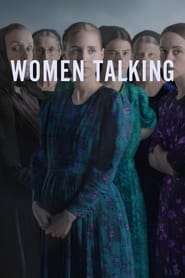Although the film in no way endorses what happened to the women, there remains a pervasive and troubling sense that it romanticises the ultraconservative Mennonite town in which they live. Although it contradicts itself later by highlighting some of the near-insurmountable structural problems inherent in such a setup, the revealingly-named 'colony' is more-or-less depicted as a community that had few issues prior to the onset of the epidemic of rapes and sexual assualts. For a genuinely sympathetic Western liberal audience (clearly the film's target demographic), there is perhaps a subliminal yearning for parts of their 'tradwife' life, not only as a way out from the rat race of modernity and all of the other failures of late capitalism, but also because its contemporary appeal in had been "strengthened by #MeToo and the pandemic, two phenomena that encouraged women to see life beyond the home as dangerous, an unmanaged territory where other people, especially men, lurk maliciously".
Alas, the film exploits these well-meaning notions with sub-Malickian shots of crops swaying in the wind, implying that the women leaving the colony would be something of a paradise lost. Yet to this viewer at least, the town was structurally and morally bankrupt from its very conception, and thus I am at a loss to explain why the film frames them leaving (with an additional attempt at melodrama through the romantic subplot) as though they were being expelled from the Garden of Eden.
Anyone watching Women Talking should probably familiarise themselves with the case on which the original novel was based. This makes for appalling reading in of itself, and not least of all because it demolishes the pseudo-happy ending of Women Talking — the rapes continued to happen even after it was 'meant' to be over, problematising the received wisdom that exposure and raising awareness is the solution to such issues. Furthermore, the news reports suggest that, contrary to the film's heavy implication that it is the outside world that's inherently dangerous to the women (symbolised through the lewd and crude Canadian in the truck), it is in fact the male Mennonite leaders who have actually 'shopped around' the globe in order to find territory in which they will be left alone by the authorities, "making for some spot where the white man might carry his burden unobserved".
Of course, one is free to draw your own conclusions as to why the venue was changed by Miriam Toews from Bolivia to Canada, but it is difficult to shake the impression it was motivated by anything other than, at best, ensuring its 'relevance' to a Western audience who might not be so energised by the plight of those in the Global South. Indeed, it is a fascinating thought experiment to imagine Women Talking about an ultraorthodox Muslim community landlocked within contemporary North America. Now, that would get the men talking.

